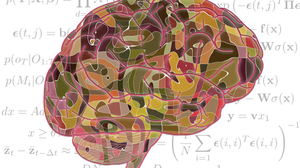Research at the Chair
If you are looking for a description of the Chair's research interests, you are in the right place!
Research Focus
Computational modelling of fast and flexible behaviour
We develop computational models in psychology and cognitive neuroscience. Our main guiding question is: ‘How can humans be both fast and flexible in their daily behaviour? For example, in a conversation, how can one, within a few hundred milliseconds, choose among the many possible things we could say? Or, on our way to work, how can we decide, within a split second, that we want to overtake someone else?
Although these decisions seem easy to us, they are a computational feat: The reason is that, before doing an action, our brain has to compute predictions about the consequences of an action and possible alternatives. From computer science, we know that these computations are involved and take time, especially in a complex, dynamic and uncertain environment like ours.
So how is the human brain able to do these computations in a split second? This is an open question, not only for psychology and neuroscience but also for computer science and machine learning. For example, according to latest estimates of experts, we are likely still decades away from fully automated vehicles because the fast decision making of humans in navigating traffic safely cannot be emulated or improved on yet.
If we knew how the brain did its fast decision making, (i) we would much better understand how exactly humans make their decisions in general and why humans sometimes show maladaptive and inflexible behaviour, and (ii) we could translate the human way of making decisions to artificial systems.
We address this question using computational modelling based on the so-called Bayesian Brain Hypothesis and methods like active inference and reinforcement learning. We use the resulting models to analyse data (e.g., behaviour, functional magnetic resonance imaging and electroencephalography) and test hypotheses experimentally.
We are part of the Collaborate Research Centre/Transregio 265 ‘Losing and regaining control over drug intake’ and the Excellence Cluster ‘Centre for Tactile Internet with Human-in-the-Loop (CeTI)’ at the TU Dresden.
Key publications
Schwöbel, S., Marković, D., Smolka, M. N., Kiebel, S. (2024) Joint modeling of choices and reaction times based on Bayesian contextual behavioral control. PLOS Computational Biology 20(7): e1012228. doi:10.1371/journal.pcbi.1012228
Cuevas Rivera, D., Kiebel, S. (2023) The effects of probabilistic context inference on motor adaptation. PLOS ONE 18(7): e0286749. doi:10.1371/journal.pone.0286749
Ott, F., Legler, E., Kiebel, S. J. (2022). Forward planning driven by context-dependent conflict processing in anterior cingulate cortex. NeuroImage, 256, 119222. doi:10.1016/j.neuroimage.2022.119222
Schwöbel, S., Markovic, D., Smolka, M. N., Kiebel, S. J. (2021). Balancing control: A Bayesian interpretation of habitual and goal-directed behavior. Journal of Mathematical Psychology, 100. doi:10.1016/j.jmp.2020.102472
Markovic, D., Goschke, T., Kiebel, S. J. (2021). Meta-control of the exploration-exploitation dilemma emerges from probabilistic inference over a hierarchy of time scales. Cognitive Affective & Behavioral Neuroscience, 21(3), 509-533. doi:10.3758/s13415-020-00837-x

